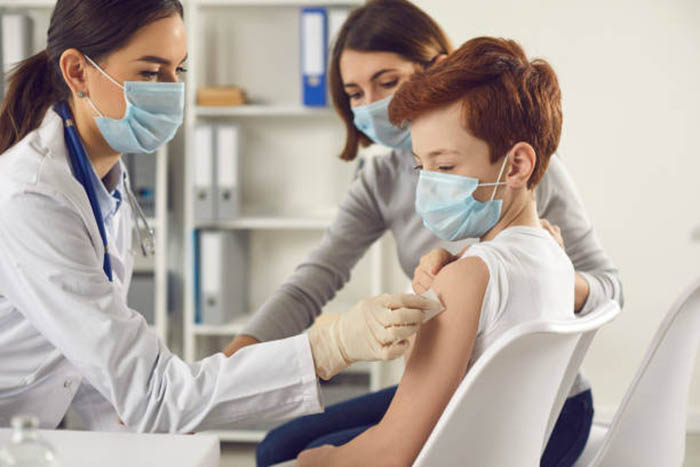
Published on November 19, 2021
Read Time: Five Minutes
The Pfizer COVID-19 vaccine is now authorized for emergency use for the prevention of COVID-19 in children ages 5 to 11. The vaccine for this age group, like others, is a two-dose series given three weeks apart. Each dose is 10 micrograms, which is one-third of the dosage of the adolescent and adult vaccine for ages 12 and older.
Read below answers to parents’ common questions about the COVID-19 vaccine for children ages 5 to 11.
Is the COVID-19 vaccine for children ages 5-11 different than the vaccine for ages 12 and older?
The vaccine approved for emergency use in children ages 5 to 11 consists of a different formulation and dose than the vaccine approved for individuals ages 12 and older. There are different color labels and caps to help prevent any confusion or errors.
Similar to other vaccines, the COVID-19 vaccine dose is based on the child's age at the time of vaccination, not size or weight. This is because the immune response to vaccines is related to the maturity of the immune system.
Is the COVID-19 vaccine for kids safe and effective?
Medical experts have overwhelmingly voted in favor of making the vaccine available to children in this age group, and here is why:
- First, the vaccine is effective. Immune responses in children 5 to 11 years of age were comparable to those of individuals 16 to 25 years of age.
- Second, the vaccine was found to be about 90% effective in preventing COVID-19 in children ages 5 to 11.
- Third, there were no severe cases of COVID-19 during clinical trials in children ages 5 to 11 out of approximately 3,100 children.
- Fourth, the vaccine works against Delta and other known variants of concern.
If children do get COVID-19, they overall have milder illness compared to adults. They are still at risk for serious illness and harm for COVID-19. More than 1.9 million children have been infected, over 8,000 have been hospitalized and 94 and have died in this age group. For those who were hospitalized, about one-third were previously healthy without underlying health conditions.
COVID-19 can also cause complications in kids, including MIS-C, a serious inflammatory condition. Long COVID is being studied in children, also.
In addition to the individual health benefits of protection from COVID-19, there are also potential benefits of less time missed from school and activities due to illness or quarantines, less missed work for parents and less community transmission.
The vaccine is recommended for children regardless of previously recovering from COVID-19. Natural immune responses to infection are variable. While many do develop immune response and protection, the duration and strength of protection is not consistent. Vaccination following natural infection provides increased protection.
Were there any concerns observed in the clinical trials of the vaccine for kids ages 5-11?
According to study data, the likelihood and severity of side effects were lower for children ages 5 to 11 compared to individuals 12 years and older. Similar to older age groups, side effects in kids ages 5 to 11 were more common after the second dose.
The side effects reported in this age group were mostly mild to moderate and include an injection site pain or redness, fatigue, headache or body aches, and chills or fever. A few experienced swollen lymph nodes. These side effects are due to the body's immune response and typically resolve within one to two days.
Myocarditis, an inflammatory heart condition, was not observed in this study’s participants. The risk of myocarditis after vaccines in this age group will continue to be closely monitored.
The clinical trials consisted of a total of 4,600 participants -- just over 3,000 of which received actual vaccine doses. The immune response and rates of side effects were compared to participants who received a placebo. Pfizer reported that the 10-microgram dose for children ages 5 to 11 produces strong immune response – the same immune responses in adults – with no serious adverse events.
Could there be long-term side effects from the COVID-19 vaccine in kids?
We do not have long-term data for mRNA COVID-19 vaccines yet. However, based on our knowledge of prior vaccines and what we know about mRNA, we do not expect long-term side effects or complications from the vaccine.
Vaccine ingredients are cleared from the body very quickly. mRNA is very fragile and degrades within 72 hours of injection. mRNA vaccines are not made of the actual pathogen, so they do not contain weakened, dead or noninfectious parts of a virus.
In the history of vaccines, serious adverse side effects have occurred within a short timeframe following rollout. We have more than 12 months of vaccine follow-up data for adults now, and [millions of] 12- to 18-year-olds have safely received the vaccine, too.
How can children ages 5-11 get the COVID-19 vaccine at Phelps Health?
We are offering COVID-19 vaccines to 5- to 11-year-old patients in our Pediatrics Clinic at Phelps Health. We continue to offer the vaccine to 12- to 18-year-olds as well. Please call (573) 426-3225 to discuss scheduling an appointment. A parent or guardian must be present for vaccination, and patients will be required to wait in the office for 15 minutes after vaccination.
Talk to Your Child's Pediatrician
We encourage parents and families to contact their child's doctor to discuss any questions or concerns they have about COVID-19 vaccines for children as well as individual risks and benefits specific to their child's health.